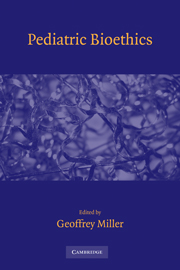Book contents
- Frontmatter
- Contents
- Contributors
- Preface
- A THE FOUNDATION: THEORY AND PRINCIPLES
- 1 Virtues and Goals in Pediatrics
- 2 Contributions of Ethical Theory to Pediatric Ethics: Pediatricians and Parents as Co-fiduciaries of Pediatric Patients
- 3 Using the Best-Interests Standard in Treatment Decisions for Young Children
- 4 The Moral and Legal Status of Children and Parents
- 5 The Ethics of Pediatric Research
- 6 Truth Telling in Pediatrics: What They Don't Know Might Hurt Them
- 7 Pediatric Ethics Committees
- B GENETICS AND THE NEWBORN
- C THERAPIES
- D END OF LIFE
- Index
2 - Contributions of Ethical Theory to Pediatric Ethics: Pediatricians and Parents as Co-fiduciaries of Pediatric Patients
Published online by Cambridge University Press: 07 May 2010
- Frontmatter
- Contents
- Contributors
- Preface
- A THE FOUNDATION: THEORY AND PRINCIPLES
- 1 Virtues and Goals in Pediatrics
- 2 Contributions of Ethical Theory to Pediatric Ethics: Pediatricians and Parents as Co-fiduciaries of Pediatric Patients
- 3 Using the Best-Interests Standard in Treatment Decisions for Young Children
- 4 The Moral and Legal Status of Children and Parents
- 5 The Ethics of Pediatric Research
- 6 Truth Telling in Pediatrics: What They Don't Know Might Hurt Them
- 7 Pediatric Ethics Committees
- B GENETICS AND THE NEWBORN
- C THERAPIES
- D END OF LIFE
- Index
Summary
INTRODUCTION
It might at first appear that pediatric ethics is sui generis, but it is a mistake to think so. Consider the well-known clinical ethical concept of pediatric assent. This ethical concept was pioneered in the 1980s by Sanford Leikin and endorsed in 1995 by the American Academy of Pediatrics. Pediatric assent recognizes that minor children cannot be accorded the legal right of informed consent but that older minor children, especially adolescents with chronic diseases, are capable of adult-like decision making about the clinical management of their diagnoses. The ethical content of the concept of pediatric assent is that, to the extent that their capacity for decision making and its exercise is adult-like, children should, with very few exceptions, be treated as having authority over themselves. Assent might appear to be unique to pediatrics, but it is not. It also bears on the authority that should be given to decision making and its exercise by older patients with the diminished decision-making capacity that results from progressive dementing disorders. In other words, the ethical concept of geriatric assent should guide decision making with geriatric patients who lack intact decision-making capacity.
Rather than being understood to be sui generis, pediatric assent should be understood to be professional medical ethics applied to the specialty of pediatrics and its subspecialties. The core ethical concept of professional medical ethics is the ethical concept of the physician as fiduciary of the patient. In this chapter, I will show that pediatricians have the fiduciary ethical obligation to protect and promote the health-related interests of children.
- Type
- Chapter
- Information
- Pediatric Bioethics , pp. 11 - 21Publisher: Cambridge University PressPrint publication year: 2009
- 6
- Cited by

